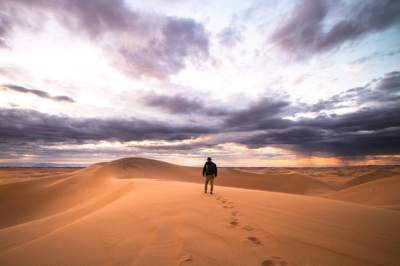“Now when Pharaoh let the people go, God did not lead them by way of the land of the Phillistines, although it was nearer; for God said, “The people may have a change of heart when they see war, and return to Egypt.” (Exodus 13:17)
For many queer and trans people, the decision to live as our authentic selves is a personal exodus, leaving what is familiar and known for new ground. It is fitting that the Trans Day of Visibility took place during Passover this year.
In dangerous times, when we leave mitzrayim, our personal Egypt, the world outside of it can feel scary. We may second guess our decision to leave. We may look back on captivity, on the closet, and wonder if it was really so bad. Some of us may instead decide we’ll stay in the land we know and do what we must to get by.
It takes time to learn to trust ourselves and our own leadership – and to learn to discern and trust ethical leadership after being oppressed. Sometimes what seems like leadership is misdirection. And God went before us in a pillar of fire, reminding us that real leadership is more than smoke and mirrors and hot air. Through a miracle, God reminds us that kings are only mortal beings, with fallible hearts that can be hardened. Freedom is a God-given right, and no false human idol can truly take it away or set us free.
And God went before them in a pillar of cloud. Sometimes we have to continue walking through storms. Sometimes it seems we cannot see the path ahead.
But liberation is a collective process. The end of captivity is only the beginning of becoming free. The generation that leaves Egypt is not the same one that enters the land of milk and honey. It takes time to make a free people. It has taken generations of our ancestors.
And Moses took with him the bones of Joseph. We stand on the shoulders of our elders, carrying their legacies with us on our backs.
God knows that we do not leave mitzrayim only once. Every day we must wake up and continue to choose to leave mitzrayim.
The trauma of captivity sometimes clings to our spirits. It clutches at our heels. It shakes our resolve. It makes us doubt our resilience. It makes us question our ability to survive.
It takes time to learn how to live as free people. God knows this. God knows that it is our time in the wilderness that transforms us from a brutalized people to free people.
God knows it is during this time in the wilderness that we become resilient and learn to embody a spirit of liberation. And when we become capable of embodying a spirit of liberation, we become capable of keeping each other going along the way in an environment we create together. It is in this time that we learn how to get each other free.
It is okay to be afraid of the wilderness. But we are here together.
Emily Strauss is a senior at Pennsylvania State University and a frequent contributor to Jewish Currents, New Voices, the Forward, and Lilith.
![people-2591942_640 | [Public Domain], via Pixabay](https://newvoices.org/wp-content/uploads/2018/04/people-2591942_640.jpg)

